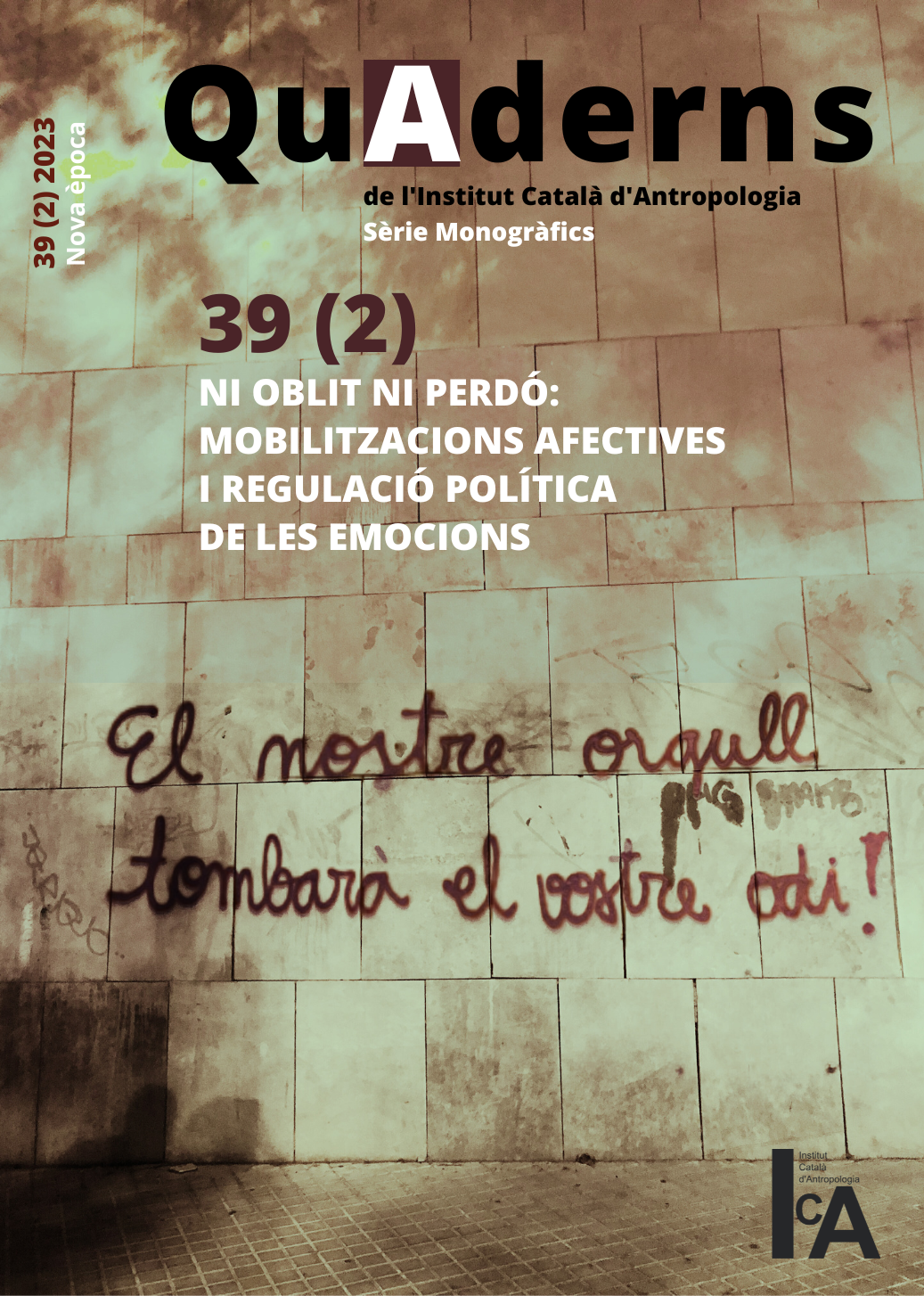"Orgull, ressentiment i menyspreu". Emociones y reglas del sentir para comprender el proceso de polarización en Catalunya
DOI:
https://doi.org/10.56247/qua.492Palabras clave:
Emociones, sociología, polarización, reglas del sentir, CatalunyaResumen
El objetivo del artículo es ofrecer algunas herramientas analíticas para comprender la polarización en el contexto político y social catalán a partir de la literatura sobre la dimensión emocional en la política contenciosa. Apoyándonos en la perspectiva de considerar las emociones como un constructo sociocultural de Arlie Hochschild, y en su investigación sobre los procesos de polarización en EE.UU., mostraremos, cómo el orgullo de sentirse catalán se puede transformar en una regla del sentir de los grupos secesionistas. También a lo largo del texto exploraremos, cómo influyen las emociones en la construcción del «nosotros» versus «ellos», o cómo emociones morales como la rabia, el orgullo, el ultraje y la indignación, o los vínculos afectivos como el odio y el desprecio son variables determinantes en el proceso de radicalización de la narrativa política entre soberanistas y secesionistas, conservadores y progresistas, y elites y grupos políticos de base.
Descargas
Estadísticas globales ℹ️
|
432
Visualizaciones
|
167
Descargas
|
|
599
Total
|
|
Citas
Alexander, J. C. (2004). Toward a Theory of Cultural Trauma. En Alexander, J. C., R. Eyerman, B. Giesen, N. J. Smelser y P. Sztompka (eds.), Cultural Trauma and Collective Identity (pp. 1-30). Berkeley (CA): University of California Press, Altman, I., y Low, S. M. (1992). Place Attachment, Human Behavior and Environment. New York: Plenum Press. DOI: https://doi.org/10.1525/9780520936768
Barbet, P. B. (2020). Encuesta sobre polarización y convivencia en Catalunya, Informe 17/2020. Barcelona: Institut Catal Internacional per la Pau.
Baron-Cohen, S. (2011). The Science of Evil: On Empathy and the Origins of Cruelty. New York: Basic Groups.
Bayard de Volo, L. (2006). The Dynamics of Emotion and Activism: Grief, Gender, and Collective Identity in Revolutionary Nicaragua. Mobilization: An International Journal, 11(4), 461-474. DOI: https://doi.org/10.17813/maiq.11.4.q21r3432561l21t7 DOI: https://doi.org/10.17813/maiq.11.4.q21r3432561l21t7
Davies, K. (2022). Sticking Together in ‘Divided Britain’: Talking Brexit in Everyday Family Relationships. Sociology, 56(1), 97-113. https://doi.org/10.1177/00380385211011569 DOI: https://doi.org/10.1177/00380385211011569
della Porta, D. y Portos, M. (2020). A bourgeois story? The class basis of Catalan independentism. Territory, Politics, Governance, 9(3), 391-411. DOI:10.1080/21622671.2020.1737208 DOI: https://doi.org/10.1080/21622671.2020.1737208
della Porta, D., O’Connor, F. y Portos, M. (2019). Protest cycles and referendums for independence. Closed opportunities and the path of radicalization in Catalonia. Revista Internacional de Sociología 77(4):e142. DOI: https://doi.org/10.3989/ris.2019.77.4.19.005 DOI: https://doi.org/10.3989/ris.2019.77.4.19.005
Ferreira, C. (2021). Entrapped in a failing course of action: Explaining the territorial crisis in 2017. Catalonia, Regional & Federal Studies. DOI: 10.1080/13597566.2021.1907570 DOI: https://doi.org/10.1080/13597566.2021.1907570
Flam, H. (2005). Emotion’s Map: a Research Agenda. En Flam, H. y King, D. (eds.), Emotions and Social Movement (pp.19-40). Abingdon: Routledge.
Flesher Fominaya, C. (2010). Collective Identity in Social Movements: Central Concepts and Debates. Sociology Compass, 4(6), 393–404. DOI: https://doi.org/10.1111/j.1751-9020.2010.00287.x DOI: https://doi.org/10.1111/j.1751-9020.2010.00287.x
Gould, D. (2009). Moving politics: emotion and ACT UP’s fight against AIDS. Chicago, IL: University of Chicago Press. DOI: https://doi.org/10.7208/chicago/9780226305318.001.0001
Gravante, T. (2020). Forced Disappearance as a Collective Cultural Trauma in the Ayotzinapa Movement. Latin American Perspectives. 47(6), 87-102. DOI:10.1177/0094582X20951773 DOI: https://doi.org/10.1177/0094582X20951773
Gravante, T. y Poma, A. (2024). “Si mañana soy yo, si mañana no vuelvo, destrúyelo todo”: Emociones y género en mujeres activistas en México. Géneroos. Revista de investigación y divulgación sobre los estudios de género, 2(3), 88–118. DOI: https://doi.org/10.53897/RevGenEr.2024.03.03 DOI: https://doi.org/10.53897/RevGenEr.2024.03.03
Hobolt, S., Leeper, T., y Tilley, J. (2021). Divided by the Vote: Affective Polarization in the Wake of the Brexit Referendum. British Journal of Political Science, 51(4), 1476-1493. DOI:10.1017/S0007123420000125 DOI: https://doi.org/10.1017/S0007123420000125
Hochschild, A. R. (1975). The Sociology of Feeling and Emotion: Selected Possibilities. En Millman, M. y Kanter, M. (eds.), Another Voice (pp. 280–307). New York: Anchor. DOI: https://doi.org/10.1111/j.1475-682X.1975.tb00339.x
Hochschild, A. R. (1979). Emotion work, feeling rules, and social structure. American Journal of Sociology, 85, 551-575. DOI: https://doi.org/10.1086/227049
Hochschild, A. R. (1983). The Managed Heart: the Commercialization of Human Feeling: Berkeley, CA: University of California Press.
Hochschild, A. R. (2016). Stranger in Their Own Land: Anger and Mourning on the American Right. New York: New Press.
Holmes, M (2004). Feeling beyond rules: politicising the sociology of emotion and anger in feminist politics. European Journal of Social Theory, 7(2), 209-227. DOI: https://doi.org/10.1177/1368431004041752
Iyengar,S. Lelkes, Y., Levendusky, M., Malhotra, N., y Westwood, S. J. (2019). The Origins and Consequences of Affective Polarization in the United States. Annual Review of Political Science, 22, 129-146. DOI: https://doi.org/10.1146/annurev-polisci-051117-073034 DOI: https://doi.org/10.1146/annurev-polisci-051117-073034
Jasper, J. M. (1997). The Art Moral of Protest: Culture, Biography, and Creativity in Social Movements. Chicago, IL: University Chicago Press. DOI: https://doi.org/10.7208/chicago/9780226394961.001.0001
Jasper, J. M. (2011). Emotions and Social Movements: Twenty Years of Theory and Research. Annual Review of Sociology, 37, 285-303. DOI: https://doi.org/10.1146/annurev-soc-081309-150015. DOI: https://doi.org/10.1146/annurev-soc-081309-150015
Jasper, J. M. (2018). The Emotions of Protest: Chicago, IL: University of Chicago Press.
Jasper, J. M. (2021). Estigma, identidad y trabajo de caracterización. Ciencia Política, 16(31), 25-40. DOI: https://doi.org/10.15446/cp.v16n31.97925 DOI: https://doi.org/10.15446/cp.v16n31.97925
Manzo, L. C. y Devine-Wright, P. (2014). Place Attachment. Advances in Theories, Methods and Applications. Abingdon: Routledge. DOI: https://doi.org/10.4324/9780203757765
Polletta, F. y Jasper, J. M. (2001). Collective Identity and Social Movements. Annual Review of Sociology, 27(1), 283-305. DOI: https://doi.org/10.1146/annurev.soc.27.1.283
Poma, A. (2018). La dimensión emocional de los movimientos de resistencia contra represas. Ambiente & Sociedade, 21. DOI: http://dx.doi.org/10.1590/1809-4422asoc0207vu18l3ao DOI: https://doi.org/10.1590/1809-4422asoc0207vu18l3ao
Poma, A. y Gravante, T. (2016). ‘Fallas del sistema’. Un análisis desde abajo del movimiento anarcopunk en México. Revista Mexicana de Sociología, 78(3), 437-467. DOI: http://dx.doi.org/10.22201/iis.01882503p.2016.3.56222.
Poma, A. y Gravante, T. (2018a). Manejo emocional y acción colectiva: las emociones en la arena de la lucha política. Estudio Sociológico, 36(108), 593-616. DOI: 10.24201/es.2018v36n108.1612. DOI: https://doi.org/10.24201/es.2018v36n108.1612
Poma, A. y Gravante, T. (2018b). Emociones, identidad colectiva y estrategias en los conflictos socio-ambientales. Andamios, 36(15), 287-309. DOI: 10.29092/uacm.v15i36.611 DOI: https://doi.org/10.29092/uacm.v15i36.611
Poma, A. y Gravante, T. (2022). Cómo estudiar la dimensión emocional en los movimientos sociales. Campos en Ciencias Sociales, 10(1). DOI: 10.15332/25006681 DOI: https://doi.org/10.15332/25006681.7667
Romanos, E. (2011). Emociones, identidad y represión: el activismo anarquista durante el franquismo. REIS,134, 87-106. DOI: 10.5477/cis/reis.134.87 DOI: https://doi.org/10.5477/cis/reis.134.87
Thompson, E. P. (1971). The Moral Economy of The English Crowd in the Eighteenth Century. Past and Present, 50, 76-136. DOI: https://doi.org/10.1093/past/50.1.76
Descargas
Publicado
Cómo citar
Número
Sección
Licencia
Distribuït sota els termes de la llicència d’ús i distribució Creative Commons Reconeixement 4.0 Internacional (CC BY-NC-SA 4.0)




